小学英语不规则名词单复数总结之欧阳数创编
- 格式:doc
- 大小:65.51 KB
- 文档页数:2
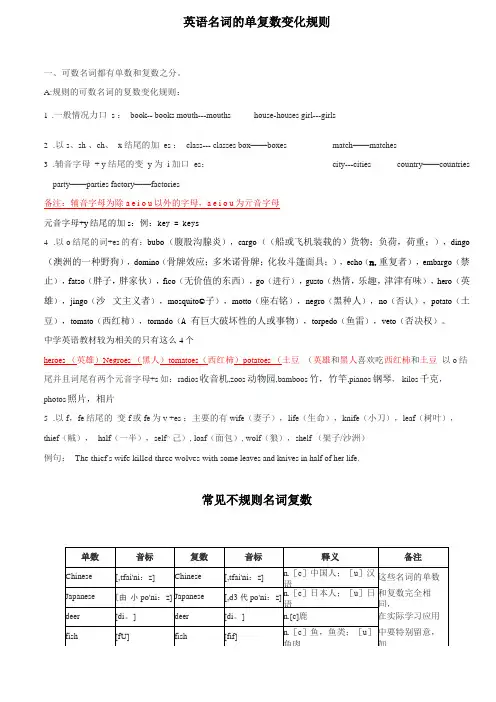
英语名词的单复数变化规则一、可数名词都有单数和复数之分。
A:规则的可数名词的复数变化规则:1.一般情况力口s :book-- books mouth---mouths house-houses girl---girls2.以s、sh 、ch、x结尾的加es :class--- classes box——boxes match——matches3.辅音字母+ y 结尾的变y 为i 加口es:city---cities country——countriesparty——parties factory——factories备注:辅音字母为除a e i o u以外的字母,a e i o u为亓音字母元音字母+y结尾的加s:例:key = keys4.以o结尾的词+es的有:bubo (腹股沟腺炎),cargo ((船或飞机装载的)货物;负荷,荷重;),dingo (澳洲的一种野狗),domino(骨牌效应;多米诺骨牌;化妆斗篷面具;),echo(n.重复者),embargo(禁止),fatso(胖子,胖家伙),fico(无价值的东西),go(进行),gusto(热情,乐趣,津津有味),hero(英雄),jingo(沙文主义者),mosquito©子),motto(座右铭),negro(黑种人),no(否认),potato(土豆),tomato(西红柿),tornado(A 有巨大破坏性的人或事物),torpedo(鱼雷),veto(否决权)。
中学英语教材较为相关的只有这么4个heroes (英雄)Negroes (黑人)tomatoes(西红柿)potatoes (土豆(英雄和黑人喜欢吃西红柿和土豆以o结尾并且词尾有两个元音字母+s如:radios收音机,zoos动物园,bamboos竹,竹竿,pianos钢琴, kilos千克,photos照片,相片5.以f,fe结尾的变f或fe为v +es :主要的有wife(妻子),life(生命),knife(小刀),leaf(树叶),thief(贼),half(一半),self^ 己),loaf(面包),wolf(狼),shelf (架子/沙洲)例句:The thief's wife killed three wolves with some leaves and knives in half of her life.常见不规则名词复数1.英语中有些名词单复数同行,主要有以下几类:A)、某些动物名词B)、某些表示人的名词C)、craft及由-craft构成的名词D)、某些表示数量的名词E)、其他2.以下这些名词单复数同形:antelope 羚羊,bison 野牛,buffalo 水牛,crab 螃蟹,deer 鹿,fish 鱼,reindeer 驯鹿,sheep 绵羊;Burmese缅甸人,Cantonese广东人,Chinese中国人,counsel法律顾问,kin亲属,Japanese日本人,Swiss 瑞士人;aircraft 飞机,craft 飞机,spacecraft 太空船;brance 双,score 二十;series 系列;species 种类;means方法只有复数形式的名词trousers裤子,pants裤子,shorts短裤glasses眼镜,compasses 圆规,scales天平,pliers钳子,clips剪子。
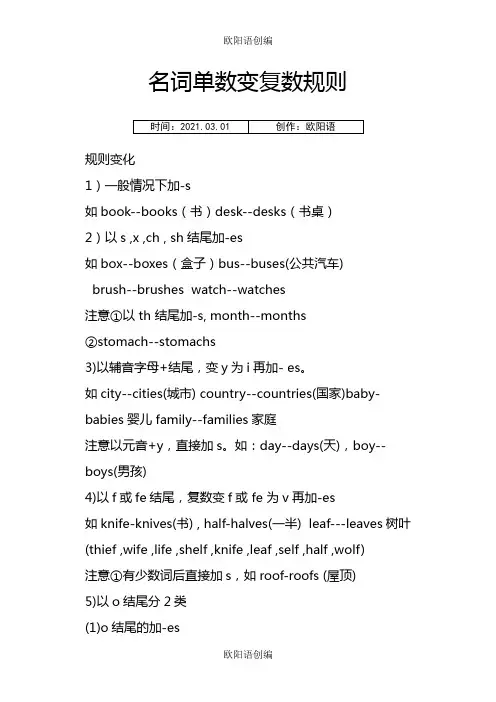
名词单数变复数规则规则变化1)一般情况下加-s如book--books(书)desk--desks(书桌)2)以s ,x ,ch , sh结尾加-es如box--boxes(盒子)bus--buses(公共汽车)brush--brushes watch--watches注意①以 th 结尾加-s, month--months②stomach--stomachs3)以辅音字母+结尾,变y为i再加- es。
如city--cities(城市) country--countries(国家)baby-babies婴儿 family--families家庭注意以元音+y,直接加s。
如:day--days(天),boy--boys(男孩)4)以f或fe结尾,复数变f或 fe 为v再加-es如knife-knives(书) , half-halves(一半) leaf---leaves树叶(thief ,wife ,life ,shelf ,knife ,leaf ,self ,half ,wolf)注意①有少数词后直接加s,如roof-roofs (屋顶)5)以o结尾分2类(1)o结尾的加-es如tomato-tomatoes(西红杮) potato-potatoes(土豆) hero-heroes(英雄)(2) o结尾名词的加-s如piano-pianos (钢琴), zoo-zoos(动物园)photo-photos (照片), kangaroo-kangaroos(袋鼠) kilo-kilos(千克)注意zero 两种方式都可:zero-zeros或 zeroes(零) 不规则变化1) 元音字母发变化。
如man--men(男人) , woman--women(妇女) tooth--teeth(牙齿) , foot--feet(脚)mouse--mice(老鼠) , policeman--policemen(警察) policewoman--policewomen(女警察)2) 词尾发生变化。
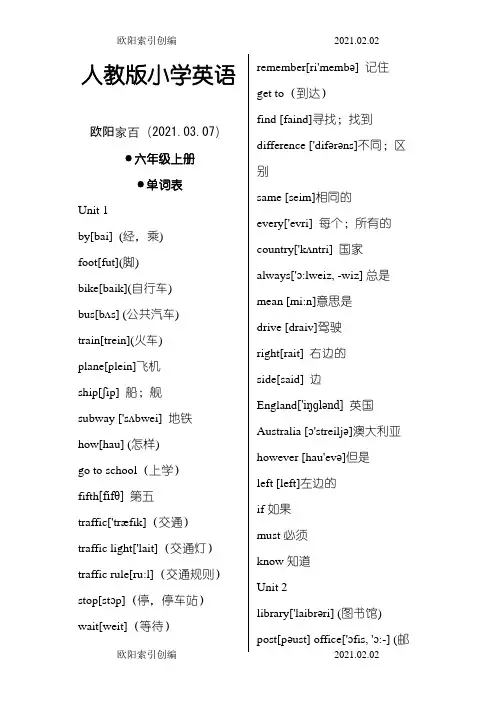
人教版小学英语欧阳家百(2021.03.07)·六年级上册·单词表Unit 1by[bai] (经,乘)foot[fut](脚)bike[baik](自行车)bus[bʌs] (公共汽车)train[trein](火车)plane[plein]飞机ship[ʃip] 船;舰subway ['sʌbwei] 地铁how[hau] (怎样)go to school(上学)fifth[fifθ] 第五traffic['træfik](交通)traffic light['lait](交通灯)traffic rule[ru:l](交通规则)stop[stɔp](停,停车站)wait[weit](等待)remember[ri'membə] 记住get to(到达)find [faind]寻找;找到difference ['difərəns]不同;区别same [seim]相同的every['evri] 每个;所有的country['kʌntri] 国家always['ɔ:lweiz, -wiz] 总是mean [mi:n]意思是drive [draiv]驾驶right[rait] 右边的side[said] 边England['iŋɡlənd] 英国Australia [ɔ'streiljə]澳大利亚however [hau'evə]但是left [left]左边的if 如果must 必须know 知道Unit 2library['laibrəri] (图书馆) post[pəust] office['ɔfis, 'ɔ:-] (邮欧阳索引创编 2021.02.02局)hospital ['hɔspitəl] (医院) cinema['sinəmə](电影院) bookstore['bukstɔ:] (书店) science ['saiəns] museum [mju:'ziəm] 科学博物馆excuse[ik'skju:z, ik'skju:s] me 对不起where(在哪里,到哪里) please(请)next to(与…相邻)far 远supermarket['sju:pə,mɑ:kit] 超市bank [bæŋk]银行after school 放学以后want 想要buy 买a pair of 一双shoe store 鞋店get off 下车minute['minit] 分钟north [nɔ:θ]北south [sauθ, sauð]南east [i:st]东west[west] 西turn[tə:n] (转弯)right (右边)left(左边)straigh[streit]t(成直线地) then[ðen] (然后)twelfth[twelfθ] 第二十party['pɑ:ti]聚会;晚会tell 告诉start[stɑ:t] 开始take [teik]乘坐look for 寻找Unit 3next week(下周)this morning(今天上午)this afternoon(今天下午)this evening (今天晚上) tonight [tə'nait]今晚tomorrow [tə'mɔrəu]明天take a trip[trip] 去旅行read a magazine[,mæɡə'zi:n] 阅欧阳索引创编 2021.02.02读杂志go to the cinema['sinəmə] 去看电影theme[θi:m] park[pɑ:k] 主题公园the Great[ɡreit] Wall [wɔ:l]长城busy['bizi] 忙碌的together[tə'ɡeðə] 一起地comic['kɔmik] book(漫画书) post[pəust]card[kɑ:d] (明信片) newspape['nju:s,peipə, 'nju:z-] r(报纸)magazine[,mæɡə'zi:n] 杂志dictionary['dikʃənəri] 词典;字典buy[bai] (购买)fruit stand [stænd]水果摊pet shop 宠物商店need[ni:d] 需要plant[plɑ:nt, plænt] 植物else[els] 其他;另外shop[ʃɔp] 商店Unit 4hobby['hɔbi] (爱好)ride a bike--riding a bike(骑自行车)dive--diving(跳水)play the violin— playing the violin[,vaiə'lin] (拉小提琴) make kites—making kites(制作风筝)collect[kə'lekt] stamps[stæmp]—collecting stamps(集邮) show[stæmp] 展览pen pal 笔友dear[diə] 亲爱的twin[twin] 双胞胎之一something ['sʌmθiŋ]某事物must 一定;肯定fun 快乐;乐趣with 同…TV reporter电视台记者live –lives(居住) teach--teaches(教) go--goes(去) watch--watches(看) read--欧阳索引创编 2021.02.02reads(读,看)does doesn’t=does not different['difərənt] 不同的week[wi:k] 星期;周say[sei] 说soon [su:n]不久excited[ik'saitid] 兴奋的;激动的Unit 5singer['siŋə] (歌唱家,歌手) writer['raitə] (作家)actor['æktə] (男演员)actress['æktris] (女演员)artis['ɑ:tist] t(画家)TV reporter[ri'pɔ:tə] (电视台记者)Hong Kong 香港engineer[,endʒi'niə](工程师) accountant[ə'kauntənt](会计) policeman[pə'li:smən] (男警察) salesperson['seilz,pə:sən] (销售员) cleaner['seilz,pə:sən] (清洁工) company['kɔmpəni] 公司where[hwεə](在哪里,到哪里)work[wə:k](工作)factory['fæktəri] 工厂design [di'zain]设计tip[tip] 有用的小建议help [help]帮助money ['mʌni]钱well 好;对;满意地enjoy [in'dʒɔi]从…获得乐趣touris['tuərist] t 旅行者;way [wei]路;道motor cycle['saikl] 摩托车police[pə'li:s] 警方;警察部门Unit 6rain[rein] (雨)cloud[klaud] (云)vapour['veipə] 蒸汽;水汽sun[sʌn] (太阳)stream[stri:m] (河,溪) come from(来自,从…来) shine [ʃain]照耀欧阳索引创编 2021.02.02become [bi'kʌm]变成little ['litl]小的drop [drɔp]一滴wake[weik] up 醒来feel ['fi:l]感觉到think[θiŋk] 想;思考meet[mi:t] 遇见high[hai] 高的other ['ʌðə]其他的fall [fɔ:l]落下down[daun] 向下into ['intu:]进入come out 露出again[ə'ɡen] 又seed[si:d] (种子)soil[sɔil] (土壤)sprout[spraut] (苗,芽)plant[plɑ:nt, plænt] (植物,种植) should (应该)then(然后)garden ['ɡɑ:dn]花园easy['i:zi] 简单的put[put] 放several['sevərəl] 一些day 天see 看见pot [pɔt]锅碗瓢盆lovely['lʌvli] 可爱的make sure[ʃuə, ʃɔ:] 核实month[mʌnθ]月份still[stil] 仍然hardly ['hɑ:dli]几乎不欧阳索引创编 2021.02.02人教版小学英语·六年级下册·单词表Unit 1tall—taller更高的short—shorter 更矮的strong—stronger更强壮的old—older 年龄更大的young—younger 更年轻的cm(centimeter) 厘米than 与…相比较funnier 更滑稽的big—bigger更大的heavy—heavier 更重的long—longer 更长的thin—thinner 更瘦的small—smaller (体型)更小feet ['fi:t, fi:t]脚(复数)size [saiz]号码;尺码wear[wεə]穿meter[mi:tə]米ton[tʌn, tuŋ]吨each[i:tʃ] 各自;每个squid[skwid] 鱿鱼lobster['lɔbstə]龙虾shark[ʃɑ:k] 鲨鱼deep[di:p] 深的seal[si:l] 海豹sperm[spə:m] whale[hweil] 抹香鲸killer['kilə] whale 虎鲸even ['i:vən]甚至Unit 2have a fever['fi:və] 发烧have a sore[sɔ:]throat[θrəut]喉咙疼have a cold[kəuld]感冒have a toothache['tu:θeik] 牙疼have a headache['hedeik] 头疼matter['mætə]事情,麻烦sore 疼的feel 感觉sick[sik] 不舒服的;有病的hurt[hə:t]疼痛nose[nəuz] 鼻子欧阳索引创编 2021.02.02people['pi:pl] 人们flu[flu:] 流感know[nəu] 知道might [mait]可以;能worry['wʌri, 'wə:ri]烦恼;担忧medicine['medisin] 药drink [driŋk]饮料stay[stei] 在;逗留better 更好的soon 立刻;不久tired['taiəd]疲劳的,累的excited[ik'saitid]兴奋的angry['æŋɡri]生气的happy['hæpi]高兴的bored[bɔ:d]无聊的,烦人的sad[sæd] 忧伤的,悲伤的trip[trip] 旅行fail [feil]不及格;失败test [test]测试hear[hiə]听见match[mætʃ] 比赛between[bi'twi:n] 在…之间pass[pɑ:s, pæs] 传递kick[kik] 踢a little 有些goal[ɡəul]得分bounce[bauns] 反弹off 距;离;离开another[ə'nʌðə]另一个guess[ɡes] 猜测win[win](过去式won)赢game [ɡeim]比赛laugh [lɑ:f, læf] at 因…而发笑Unit 3watch—watched 看wash—washed 洗clean—cleaned打扫play—played玩visit—visited 看望do—didlast weekend上一个周末go—went去go to a park—went to a park 去公园go swimming—went欧阳索引创编 2021.02.02swimming去游泳go fishing—wentfishing去钓鱼read—read 读go hiking—went hiking 去郊游yesterday['jestədi,-dei] 昨天study['stʌdi](过去式studied)学习tongue[tʌŋ] twister['twistə]绕口令fiy(过去式 flew) 飞return[[ri'tə:n]]送回;归还swim[swim](过去式swam)游泳Unit 4learn[lə:n] Chinese—learned Chinese学汉语sing[siŋ] and dance[dɑ:ns,dæns]—sang[sæŋ] and danced 唱歌和跳舞eat good food—ate[et,eit] good food吃好吃的食物take pictures—took[tuk] pictures 照相climb—climbed 爬have—hadbuy presents['prezənt s,pri'zents]—bought[bɔ:t] presents买礼物row[rəu] a boat[bəut]—rowed a boat 划船see[si:] elephant['elifənt]—saw[sɔ:] elephant 看大象go skiing—went skiing 去滑雪go ice-skating—wentice-skating 去滑冰how怎么,如何get—got 到达last上一个的,仅余的,留在最后的cousin堂(表)兄弟;堂(表)姐妹relax[ri'læks] 放松prepare[pri'pεə]准备欧阳索引创编 2021.02.02。
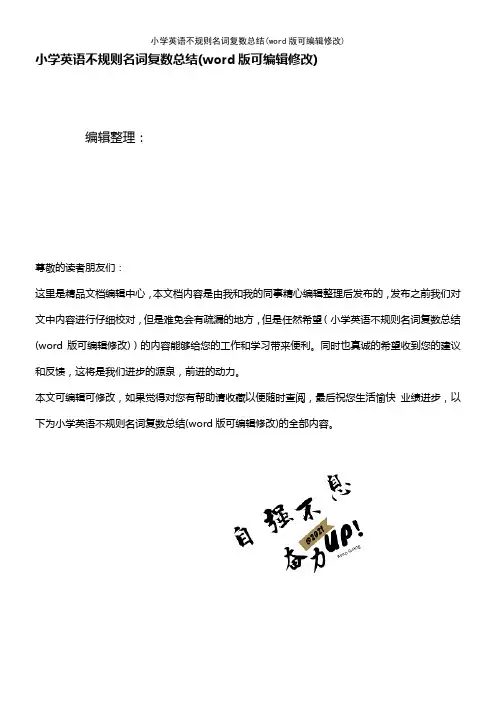
小学英语不规则名词复数总结(word版可编辑修改)编辑整理:尊敬的读者朋友们:这里是精品文档编辑中心,本文档内容是由我和我的同事精心编辑整理后发布的,发布之前我们对文中内容进行仔细校对,但是难免会有疏漏的地方,但是任然希望(小学英语不规则名词复数总结(word版可编辑修改))的内容能够给您的工作和学习带来便利。
同时也真诚的希望收到您的建议和反馈,这将是我们进步的源泉,前进的动力。
本文可编辑可修改,如果觉得对您有帮助请收藏以便随时查阅,最后祝您生活愉快业绩进步,以下为小学英语不规则名词复数总结(word版可编辑修改)的全部内容。
小学英语名词复数形式归纳不规则名词复数:一、部分单词的复数形式不变.读音变化:保持原音。
例:fish—fish; sheep-sheep; cattle-cattle; deer-deer; salmon-salmon ;cannon —cannon; trout—trout 鳟鱼;Chinese;Germans ;Swiss ;Japanese。
二、少数单词,其复数形式没有任何规律.读音变化:没有规律。
例:man—men; woman—women; child—children; person-people;foot—feet; tooth-teeth; goose-geese, mouse—mice。
三、另外还有一些名词,其复数形式有时可表示特别含义,例: waters(水域); fishes(各种)鱼;times(时代);drinks(饮料); looks(外表),papers(文件报纸),brains(头脑智力), sands(沙滩),goods(货物),customs(海关), forces(军队), spirits(情绪), manners(礼貌), greens(青菜), ruins(废墟)四、另一些名词则以复数词出现的机会较多例:bellows风箱; clothes; police; shorts短裤;scissors剪刀; shears大剪刀;trousers长裤; wages工资;spectacles,glasses,眼镜。
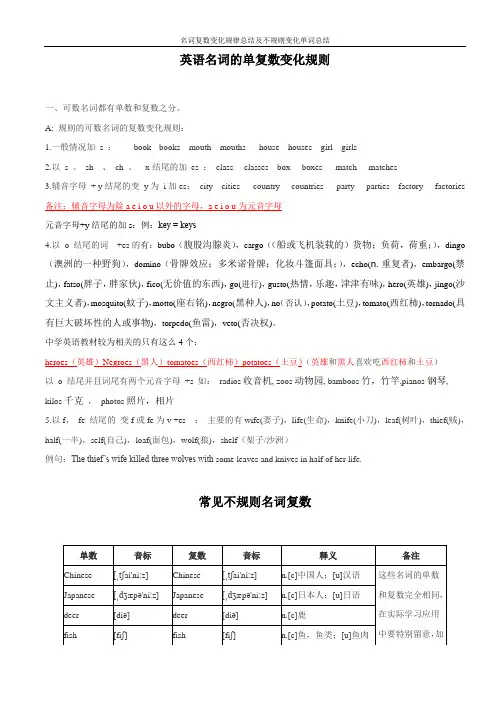
英语名词的单复数变化规则一、可数名词都有单数和复数之分。
A: 规则的可数名词的复数变化规则:1.一般情况加s :book-- books mouth---mouths house---houses girl---girls2.以s 、sh 、ch 、x结尾的加es :class--- classes box----boxes match----matches3.辅音字母+ y结尾的变y为i加es:city---cities country----countries party----parties factory----factories 备注:辅音字母为除a e i o u以外的字母,a e i o u为元音字母元音字母+y结尾的加s:例:key = keys4.以o 结尾的词+es的有:bubo(腹股沟腺炎),cargo((船或飞机装载的)货物;负荷,荷重;),dingo (澳洲的一种野狗),domino(骨牌效应;多米诺骨牌;化妆斗篷面具;),echo(n. 重复者),embargo(禁止),fatso(胖子,胖家伙),fico(无价值的东西),go(进行),gusto(热情,乐趣,津津有味),hero(英雄),jingo(沙文主义者),mosquito(蚊子),motto(座右铭),negro(黑种人),no(否认),potato(土豆),tomato(西红柿),tornado(具有巨大破坏性的人或事物),torpedo(鱼雷),veto(否决权)。
中学英语教材较为相关的只有这么4个:heroes(英雄)Negroes(黑人)tomatoes(西红柿)potatoes(土豆)(英雄和黑人喜欢吃西红柿和土豆)以o 结尾并且词尾有两个元音字母+s 如:radios收音机, zoos动物园, bamboos竹,竹竿,pianos钢琴, kilos千克,photos照片,相片5.以f,fe 结尾的变f或fe为v +es :主要的有wife(妻子),life(生命),knife(小刀),leaf(树叶),thief(贼),half(一半),self(自己),loaf(面包),wolf(狼),shelf(架子/沙洲)例句:The thief’s wife killed three wolves with some leaves and knives in half of her life.常见不规则名词复数1. 英语中有些名词单复数同行,主要有以下几类:A)、某些动物名词B)、某些表示人的名词C)、craft及由-craft构成的名词D)、某些表示数量的名词E)、其他2. 以下这些名词单复数同形:antelope 羚羊,bison 野牛,buffalo 水牛,crab 螃蟹,deer 鹿,fish 鱼,reindeer 驯鹿,sheep 绵羊;Burmese 缅甸人,Cantonese 广东人,Chinese 中国人,counsel 法律顾问,kin 亲属,Japanese 日本人,Swiss瑞士人;aircraft 飞机,craft 飞机,spacecraft 太空船;brance 双,score 二十;series 系列;species 种类;means方法只有复数形式的名词trousers裤子,pants裤子,shorts短裤glasses眼镜,compasses圆规,scales天平,pliers钳子,clips剪子。
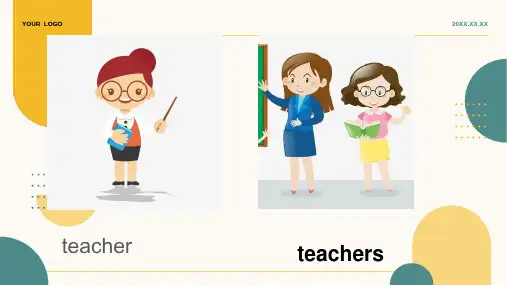
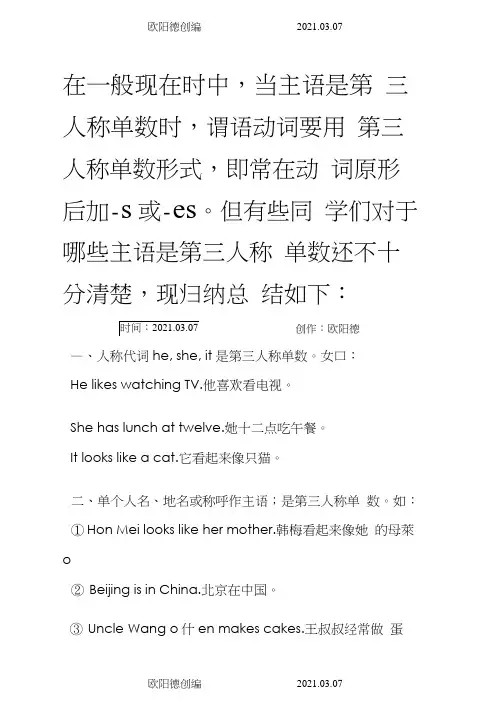
在一般现在时中,当主语是第 三人称单数时,谓语动词要用 第三人称单数形式,即常在动 词原形后加-s 或-es 。
但有些同 学们对于哪些主语是第三人称 单数还不十分清楚,现归纳总 结如下:—、人称代词he, she, it 是第三人称单数。
女口:He likes watching TV.他喜欢看电视。
She has lunch at twelve.她十二点吃午餐。
It looks like a cat.它看起来像只猫。
二、单个人名、地名或称呼作主语;是第三人称单 数。
如: ① Hon Mei looks like her mother.韩梅看起来像她 的母萊o② Beijing is in China.北京在中国。
③ Uncle Wang o 什en makes cakes.王叔叔经常做 蛋创作:欧阳德糕。
三、单数可数名词或“this / that / the+单数可数名词“ 作主语时,是第三人称单数。
女口:①A horse is a useful animal.马是有用的动物。
②This book is yours.这本书是你的。
③That car is red.那辆小汽车是红色的。
④The cat is Lucy's.这只猫是露茜的。
四、不定代词someone, somebody, nobody, everything, something 等及指示代词this, that 作主语时,是第三人称单数。
女口:①Everyone is here.大家到齐了。
②There is something wrong with the watch.这块手表有毛病。
③This is a pen.这是一支钢笔。
④That is an eraser.那是一块橡皮擦。
五、不可数名词作主语时为第三人称单数。
女口:①The milk is in the glass.牛奶在玻璃杯里。
②The bread is very small.那面包很小。
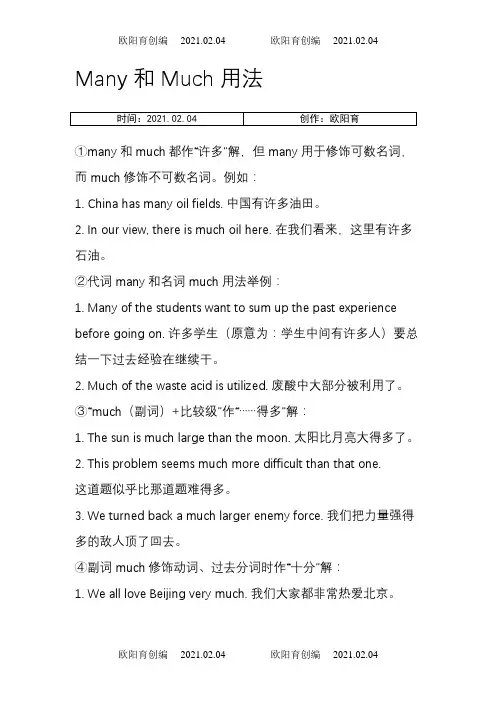
Many和Much用法①many和much都作“许多”解,但many用于修饰可数名词,而much修饰不可数名词。
例如:1. China has many oil fields. 中国有许多油田。
2. In our view, there is much oil here. 在我们看来,这里有许多石油。
②代词many和名词much用法举例:1. Many of the students want to sum up the past experience before going on. 许多学生(原意为:学生中间有许多人)要总结一下过去经验在继续干。
2. Much of the waste acid is utilized. 废酸中大部分被利用了。
③“much(副词)+比较级”作“……得多”解:1. The sun is much large than the moon. 太阳比月亮大得多了。
2. This problem seems much more difficult than that one.这道题似乎比那道题难得多。
3. We turned back a much larger enemy force. 我们把力量强得多的敌人顶了回去。
④副词much修饰动词、过去分词时作“十分”解:1. We all love Beijing very much. 我们大家都非常热爱北京。
2. We are much interested in heat utilization. 我们对热量利用十分感兴趣。
注:上述两种句子,一般不能用very代替much。
有时much也可修饰作表语用的形容词:It is much the same. 差不多相同。
⑤many和much的一些常用词组:many a time 许多次how many books 多少书how much water 多少水as much (many) 同样多as much (many) as 像……那么多倍数+as much (many) as………的……倍(那么多)much less 何况(用于否定)much more 何况(用于肯定)注1:much和many的比较级和最高级都是more和most,分别详见第337页和225页。
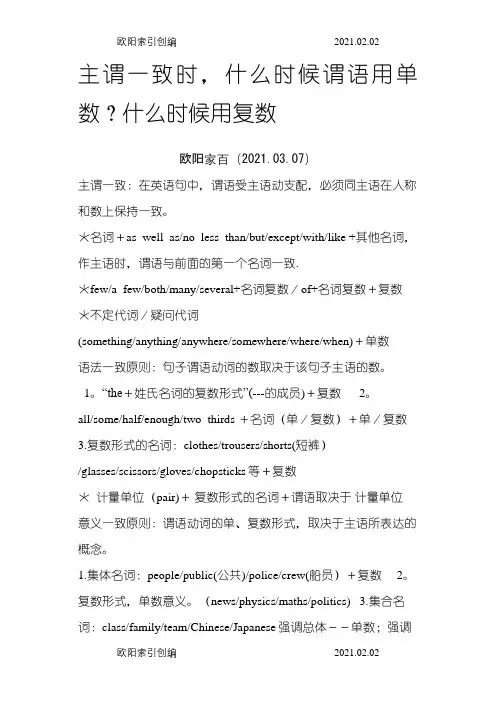
主谓一致时,什么时候谓语用单数?什么时候用复数欧阳家百(2021.03.07)主谓一致:在英语句中,谓语受主语动支配,必须同主语在人称和数上保持一致。
*名词+as well as/no less than/but/except/with/like +其他名词,作主语时,谓语与前面的第一个名词一致.*few/a few/both/many/several+名词复数/of+名词复数+复数*不定代词/疑问代词(something/anything/anywhere/somewhere/where/when)+单数语法一致原则:句子谓语动词的数取决于该句子主语的数。
1。
“the+姓氏名词的复数形式”(---的成员)+复数 2。
all/some/half/enough/two thirds +名词(单/复数)+单/复数3.复数形式的名词:clothes/trousers/shorts(短裤)/glasses/scissors/gloves/chopsticks等+复数*计量单位(pair)+复数形式的名词+谓语取决于计量单位意义一致原则:谓语动词的单、复数形式,取决于主语所表达的概念。
1.集体名词:people/public(公共)/police/crew(船员)+复数 2。
复数形式,单数意义。
(news/physics/maths/politics) 3.集合名词:class/family/team/Chinese/Japanese强调总体--单数;强调个体--复数。
The class has 45 students. The class are planting trees on the hill.4.时间、距离、价格、重量的复数名词/算式+单数 Ten days is a long time.5.the +形容词“表一类人”+复数; The rich have much money.6.and/both--- and + 复数 7。
![小学常用名词复数不规则变化总结[五篇范文]](https://uimg.taocdn.com/7deab7030a4c2e3f5727a5e9856a561253d3217b.webp)
小学常用名词复数不规则变化总结[五篇范文]第一篇:小学常用名词复数不规则变化总结名词单复数变化规则1)不规则变化常考需掌握的有: child---children foot---feet tooth---teethmouse---miceman---men woman---women注意:与man 和woman构成的合成词,其复数形式也是-men 和-women。
如: an Englishman,two Englishmen.注意:German 不是合成词,故复数形式为Germans 2)单复同形deer,sheep,fish,Chinese,Japanese(但除人民币元、角、分外,美元、英镑、法郎等都有复数形式,这个知识点不常考,只需了解)如:a dollar-two dollars;a meter-two meters3)集体名词,以单数形式出现,但实为复数。
people police 也就是说,谓语部分用are4)以s结尾,仍为单数的名词a.maths,politics,physics等学科名词,为不可数名词,是单数。
b.news 是不可数名词。
c.the United States,the United Nations 应视为单数。
5)表示由两部分构成的东西glasses(眼镜)trousers, clothes 若表达具体数目,要借助数量词pair(对,双);suit(套);a pair of glasses;two pairs of trousers 6)另外还有一些名词,其复数形式有时可表示特别意思 goods货物,waters 水域,fishes(各种)鱼 7)规则变化a.直接在名词后面加-s Book-books car-carsb.以s sh ch x结尾,在后面加-es bus-buses box-boxesc.以o结尾,一般在后面加s photo-photos 但tomato potato mango hero negro 除外,要在后面加-esd.以-f-fe 结尾,要变为-ves wife-wives knife-knivese.以辅音字母加y结尾,变y 为i,再加-es family-families(注意:monkey-monkeys 因为是元音字母加-y)第二篇:名词单复数变化名词的单复数形式变化一、最常见的就是直接在名词后面+s Boy—boys(男孩)cat—cats(猫)room—rooms(房间)horse—horses(马)tree—trees (树)rose—roses(玫瑰)二、如果名词是以x、s、sh、ch结尾的,在名词后面+es Branch—branches(树枝)match—matches(火柴)fox—foxes (狐狸)class—classes(班级)bus—buses(公交车)Box—boxes(箱子)watch—watches(手表)dish—dishes(盘子)coach—coaches(车厢)couch—couches(沙发)三、如果名词是以辅音加y结尾的,要变y为i加es;如果不是以辅音结尾的,就直接在y后面加上s Family—families(家庭)study—studies(学习)party—parties(派对)baby—babies(宝贝)city—cities(城市)Boy—boys(男孩)toy—toys(玩具)way—ways(方法、路)monkey—monkeys(猴子)key—keys(钥匙)四、当名词是以fe或f结尾的,要变fe或f为v,再加es;有的直接加s Thief—thieves(小偷)shelf—shelves(书架)leaf—leaves(树叶)half—halves(一半)Wolf—wolves(狼)life—lives(生活、生命)wife—wives(妻子)knife—knives(刀)Roof—roofs(房顶)belief—beliefs(信念)proof—proofs(证据)五、当名词是以o结尾有生命的加es,没有生命的加s Potato—potatoes(土豆)tomato—tomatoes(西红柿)hero—heroes(英雄)Photo—photos(相片)zoo—zoos (动物园)radio—radios(广播)piano—pianos(钢琴)六、名词复数不规则变化Child—children(小孩)mouse—mice(老鼠)man—men (男人)woman—women(女人)German—Germans(德国人)Englishman—Englishmen(英国人)Frenchman---frenchmen(法国人)foot—feet(足,脚)tooth—teeth(牙齿)1)单复数同形Deer—deer(鹿)fish—fish(鱼)Chinese—Chinese(中国人)Japanese—Japanese(日本人)2)集体名词,名词以单数的形式出现,但是实际上是指的复数People(人们)police(警察)public (公众)第三篇:小学英语名词复数变化规则名词复数变化规则备注:其中红色第1, 2,3条和第4条的部分内容为目前学过的单词,需要熟记。
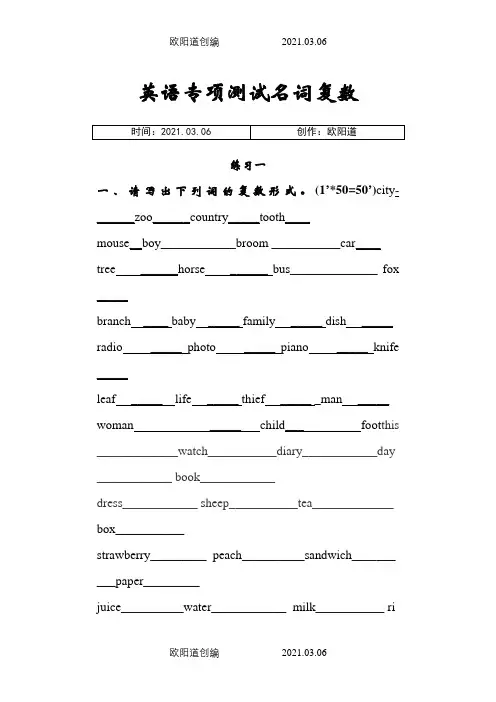
英语专项测试名词复数练习一一、请写出下列词的复数形式。
(1’*50=50’)city-______zoo______country_____tooth____mouse__boy____________broom ___________car____tree ______horse ______ bus______________ fox _____branch ____ baby _____ family _____ dish _____ radio _____ photo _____ piano _____ knife _____leaf _____ life _____ thief _____ _man _____ woman _____ child___ foot this_____________watch___________diary____________day____________ book____________dress____________ sheep___________tea_____________ box___________strawberry_________ peach__________sandwich__________paper_________juice__________water____________ milk___________ rice__________people CD ox___________deer______ ______fish___________二、单项选择(1’*10=10’)( )1. The __ in our yard are very beautiful.A. clothB. waterC. flowers( )2. Tom is one of the Chinese _____ in our school.A. boyB. boysC. boies( )3. A cat has four ____ , doesn't it?A. footsB. feetC. feets( )4. There are three ____ and five _____ in the room.A. American, JapaneseB Americans, Japanese C. American, Japanese( )5. Can you see nine ____ in the picture?A. fishB. bookC. horse( )6. The _____ has two______.A. boy; watchB. boy; watchesC. boys; watch( )7. The _____ are flying back to their country.A. GermanyB. GermanysC. Germans( )8. The girl brushes her _____ every day before she goes to bed.A. toothsB. teethC. teeths( )9.I saw many _____ in the street.A. peoplesB.peopleC.people’s( )10.The green sweater is his _________.A.brotherB.brothersC.brother’s三、选择填空(1’*10=10’)( )1. They come from different ______A. countryB. countriesC. a countryD. countrys( )2. How many ______ do you see in the picture?A. tomatosB. tomatoesC. tomatoD. the tomato( )3. They are______.A . woman teachers B. women teachersC. women teacherD. woman teacher( )4. Would you like _______ ,please?A. two glass of waterB. two glasses of waterC. two glass of watersD. two glasses of waters( )5. Most of ______ live in _______.A. Germans, GermanB. German, GermenC. Germen, GermanyD. Germans, Germany( )6. There are some ______ in these _______.A.knifespencil-boxesB.knivespencils-boxC.knivespencil-boxD.knivespencils-boxes( )7. ______ like ______ by air.A. Greens, travellingB. The Green, travelingC. The Greens, travelD. The Greens, traveling( )8. I wonder why ______ are interested in action films(武打片).A. the peopleB. peopleC. peoplesD. the peoples( )9. There is no ______ in the plate.A. applesB. orangesC. riceD. eggs( )10.My uncle has three _______.A.childB.childsC.childrenD.childrens四.填入所给名词的正确形式(2’*10=20’)1. I have two____________ (knife)2. There are many ___________ here. (box)3. There are many ___________ on the road. (bus)4. A few ___________ are drawing on the wall. (boy)5.The ______________ are playing football now.(child)6.Please take two _______________ for me. (photo)7.I like the red ________________.(tomato)8.Would you please clean your _____________ now?(tooth)9.Do you want some _________? (milk)10.There are ten ___________________in our school.(woman teacher)单、复数练习一.练习:写出下列各词的复数(本项积分6分,每题0.2分)I _____ him ______ this ______ her _____ watch ____ child _______ photo _______ diary _____ day_____foot____ book______ dress________ tooth_______ sheep ______ box______ strawberry _______ thief _____ yo-yo ________ peach______ sandwich _____ man______ woman______ paper______ juice_______ milk_____rice_____ tea_____ people_______ CD______二. 请把下列各词变成复数形式,没做完不许看答案哦。
英语名词的单复数变化规则一、可数名词都有单数和复数之分。
A: 规则的可数名词的复数变化规则:1.一般情况加s :book-- books mouth---mouths house---houses girl---girls2.以s 、sh 、ch 、x结尾的加es :class--- classes box----boxes match----matches3.辅音字母+ y结尾的变y为i加es:city---cities country----countries party----parties factory----factories 备注:辅音字母为除a e i o u以外的字母,a e i o u为元音字母元音字母+y结尾的加s:例:key = keys4.以o 结尾的词+es的有:bubo(腹股沟腺炎),cargo((船或飞机装载的)货物;负荷,荷重;),dingo (澳洲的一种野狗),domino(骨牌效应;多米诺骨牌;化妆斗篷面具;),echo(n. 重复者),embargo(禁止),fatso(胖子,胖家伙),fico(无价值的东西),go(进行),gusto(热情,乐趣,津津有味),hero(英雄),jingo(沙文主义者),mosquito(蚊子),motto(座右铭),negro(黑种人),no(否认),potato(土豆),tomato(西红柿),tornado(具有巨大破坏性的人或事物),torpedo(鱼雷),veto(否决权)。
中学英语教材较为相关的只有这么4个:heroes(英雄)Negroes(黑人)tomatoes(西红柿)potatoes(土豆)(英雄和黑人喜欢吃西红柿和土豆)以o 结尾并且词尾有两个元音字母+s 如:radios收音机, zoos动物园, bamboos竹,竹竿,pianos钢琴, kilos千克,photos照片,相片5.以f,fe 结尾的变f或fe为v +es :主要的有wife(妻子),life(生命),knife(小刀),leaf(树叶),thief(贼),half(一半),self(自己),loaf(面包),wolf(狼),shelf(架子/沙洲)例句:The thief’s wife killed three wolves with some leaves and knives in half of her life.常见不规则名词复数1. 英语中有些名词单复数同行,主要有以下几类:A)、某些动物名词B)、某些表示人的名词C)、craft及由-craft构成的名词D)、某些表示数量的名词E)、其他2. 以下这些名词单复数同形:antelope 羚羊,bison 野牛,buffalo 水牛,crab 螃蟹,deer 鹿,fish 鱼,reindeer 驯鹿,sheep 绵羊;Burmese 缅甸人,Cantonese 广东人,Chinese 中国人,counsel 法律顾问,kin 亲属,Japanese 日本人,Swiss瑞士人;aircraft 飞机,craft 飞机,spacecraft 太空船;brance 双,score 二十;series 系列;species 种类;means方法只有复数形式的名词trousers裤子,pants裤子,shorts短裤glasses眼镜,compasses圆规,scales天平,pliers钳子,clips剪子。
英语名词单数变复数的规则一、绝大多数的可数名词的复数形式,是在该词末尾加上后辍-s。
读音变化:结尾是清辅音读[s],结尾是浊辅音或元音读[z]。
例:friend→friends; cat→cats; style→styles; sport→sports; piece→pieces二、凡是以s、z、x、ch、sh结尾的词,在该词末尾加上后辍-es构成复数。
读音变化:统一加读[iz]。
例:bus→buses; quiz→quizzes; fox→fox es; match→matches; flash→flashes三、以辅音字母+y结尾的名词,将y改变为i,再加-es。
读音变化:加读[z]。
例:candy→candies; daisy→daisies; fairy→fairies; lady→ladies; story→stories四、以-o结尾的名词,如果不是外来词或缩写,就加-es,否则加-s构成复数。
读音变化:加读[z]。
例:tomato→tomatoes; potato→potatoes; torpedo→torpedoes; bingo→bingoes反例:silo→silos; piano→pianos(外来词); photo→photos; macro→macros(缩写词)五、以-f或-fe结尾的名词,多为将-f或-fe改变为-ves,但有例外。
读音变化:尾音[f]改读[vz]。
例:knife→knives; life→lives; leaf→leaves; staff→staves; scarf→scarves反例:roof→roofs六、以-us结尾的名词(多为外来词),通常将-us改变为-i 构成复数。
读音变化:尾音[Es]改读[ai],其中[kEs]要改读为[sai],[gEs]要改读为[dVai]。
例:fungus→fungi; abacus→abaci; focus→foci; cactus→cacti; cestus→cesti七、以-is结尾的名词,通常将-is改变为-es。
•英语不规则名词复数表1. 以f或fe结尾:大多数以f或fe结尾的名词的复数形式时将其转为ves,但个别直接加s:* roof →roofs 屋顶* gulf →gulfs 海湾* grief →griefs悲伤, 悲痛, 担心* cliff →cliffs 悬崖, 峭壁* beef →beefs 牛肉* chief →chiefs 首长, 首领* proof →proofs 证明* staff →staffs 全体职员2. 元音:改变它们的元音声:* -man →-men 男……* -woman →-women 女……* fireman →firemen 消防员* foot →feet 脚* goose →geese 鹅* tooth →teeth 牙齿* mouse →mice 老鼠* louse →lice 虱子3. 古代英语:有些是沿用古代英语:* child →children 小孩, 儿童* ox →oxen 牛, 阉牛4. 以o结尾:①以o结尾的单词加“s”:(无生命)* auto →autos [美口] 汽车* kangaroo →kangaroos 袋鼠* kilo →kilos 千克, 公斤* memo →memos [口] 备忘录* photo →photos 照片* piano →pianos 钢琴* pimento →pimentos 多香果* pro →pros 赞成意见* con →cons 反对意见* solo →solos, soli 独唱, 独奏* soprano →sopranos 女高音* studio →studios 工作室* tattoo →tattoos 文身* video →videos 视频* zoo →zoos 动物园* bamboo →bamboos 竹子②有的则加“e s”(有生命):* echo →echoes 回声, 反响* embargo →embargoes 禁运, 禁运令* hero →heroes 英雄* potato →potatoes 土豆* tomato →tomatoes 番茄* torpedo →torpedoes 鱼雷, 水雷* veto →vetoes 否决, 否决权* negro →negroes 黑人③有的两种都可以:* buffalo →buffalos / buffaloes / buff alo 水牛* cargo →cargos / cargoes (船/飞机的)货物* halo →halos / haloes 光环* mosquito →mosquitos / mosquitoes 蚊子* motto →mottos / mottoes 箴言, 格言* no →nos / noes没有* tornado →tornados / tornadoes 龙卷风* volcano →volcanos / volcanoes 火山* zero →zeros / zeroes 零* commando →commands / commandoes 突击员5. 不变:单复数一样:* cod →cod 鳕鱼* deer →deer 鹿* fish →fish 鱼, 鱼类* offspring →offspring 子孙, 后裔, 幼崽* perch →perch 鲈鱼* sheep →sheep 绵羊* trout →trou鲑鱼* bison →bison 野牛* moose →moose 驼鹿* aircraft →aircraft 飞机, 飞行器* barracks →barracks 兵营* crossroads →crossroads 十字路口* dice →dice 骰子* gallows →gallows 绞刑架* headquarters →headquarters 总部* means →means 方法, 手段, 途径* series →series 系列* species →species 物种6. 借用单词:英语中有些单词是借用其他语言的。
1、一般来说,s在元音或浊辅音后读[z},在清辅音后面读成[s],在[t]后与[t]在一起读成[ts],在[d]后与[d]一起读成[dz]。
cups 杯子 days 日子 hands 手 hats 帽子2、以s,sh,ch,x结尾的词在词尾加-es,读[iz]classes 班级 buses 公共汽车 boxes 盒子 watches 手表3、以“元音字母+y”结尾的词,加-s,读作[z];以辅音字母+y结尾的词,变y为i,再加-es,读[iz]。
boy-boys 男孩army-armies 军队story-stories 故事factory-factories 工厂 baby-babies 宝贝4、以o结尾的词,多数加-s,读[z]。
kilo-kilos 公里 photo-photos 照片 tobacco-tobaccos 烟草 piano-pianos 钢琴以元音字母+o结尾的词一律加-s,读[z]。
zoo-zoos 动物园 radio-radios 收音机少数以o结尾的词,在词尾加-es,读[z]。
tomato-tomatoes 西红柿hero-heroes 英雄Negro-Negroes 黑人 potato-potatoes 土豆5、以f或fe结尾的词,多数把f,fe变为v,再加-es,读[s]。
leaf-leaves 树叶 thief-thieves 小偷 wife-wives 妻子knife-knives 小刀 shelf-shelves 架子6、不规则名词的复数形式。
(1)、通过变化单词内部元音字母,构成复杂形式。
man-men 男子 woman-women 女人 foot-feet 脚 goose-geese 鹅tooth-teeth 牙齿mouse-mice 老鼠child-children 小孩(2)、单数形式与复数形式相同sheep-sheep 绵羊 deer-deer 鹿 Chinese-Chinese 中国人 Japanese-Japanese 日本人规则的名词复数形式一般是在单词后加-s 或-es。
名词变复数2.一般情况下,直接加s,如:apple-______,pig-______,book-______等2.以s、sh、ch、x结尾的名词,加es,如:bus-_______(公车),class-_______(班级) ,watch-_______(手表),box-_______(盒子),fox-_______(狐狸)3.以元音字母+y结尾的名词,直接加s,如:boy-_______(男孩),toy-_______(玩具)4.以辅音字母+y结尾的名词,去y改ies,如:family-_______(家庭),strawberry-_______(草莓)5.以f或fe结尾的名词,去f或fe改ves,如:wife-_______,knife-_______,wolf-_______ (这三个词的记忆口诀---“妻子”拿着“小刀”杀了“狼”)6.以”o"结尾的名词:(1)有生命的,加es,如:potato-_______,tomato-_______,hero-_______ (这三个词的记忆口诀---”英雄“爱吃”土豆“和”西红柿“)(2)无生命的,加s,如:photo-_______(照片),radio-_______(收音机)7.将“oo”改为“ee"的名词,如:tooth-_______(牙),foot-_______(脚),goose-_______(鹅)8.单复同形的名词:(1)fish-_______(fish当种类的适合变_______),sheep-_______(绵羊),paper-_______(纸), Chinese-_______(中国人),Japanese-_______(日本人),people-_______(peoples表示“民族”)(2)不可数名词,如:water(水),rice(米饭),milk(牛奶),juice(果汁),bread(面包),tea(茶),orange(橙汁)9.不规则变化的名词:(1)man-_______,woman-_______ (记忆方法---“男人”“女人”将a改e)延伸:policeman-_______,policewoman-_______(2)child-_______(孩子)(3)mouse-_______(老鼠)(4)根据中文意思变化的名词,如:I-_______(我-我们),you-_______(你-你们),he/she/it-_______(他/她/它-他们),this-_______(这个-这些),that-_______(那个-那些)同学们,快来看看自己做的怎么样吧!写出下列名词的复数形式:I this that watch child photo di ary(日记) day(天) foot book dress(连衣裙) tooth sheep box strawberry wolf peach yo-yo(悠悠球) sandwich man woman paper water juice tea mousehero-_____puppy-______box-______knife-______fly-_____fox-_______bus-_______bench-________brush-________ self-_____kiss-________church-________dish-______ruler-_______peach-_____glass-_______pencil-____boy-______zoo-_______man-______roof-________sheep-_______knife-______lady-_______key-_______ story-_______watch-______bamboo-_______city-_______family-________ thief-______mouse-_______fish-______goose-______people-_Chinese-________deer-________foot-______child-______tooth-_______写出下列名词单复数的形式。
名词的词形变化1.不规则复数形式1)来自古英语的复数形式,如:child---children foot---feet tooth---teeth goose---geeseman---men woman---women mouse---mice louse---liceox---oxen penny---pence analysis---analyses appendix---appendicesparenthesis---parentheses basis---bases stimulus---stimuli ellipsis---ellipsesaxis---axes hypothesis---hypotheses oasis---oases crisis----crisescriterion---criteria phenomenon---phenomena datum---data medium---mediabacterium---bacteria nucleus---nuclei fungus---fungialumnus---alumni focus---foci radius---radii terminus---terminilarva---larvae alga---algae formula---formulaedata---dataslens---lenses。
2)词尾读音为[f]并以-f或0-fe结尾的名词复数形式有以下几种情况:a)规则形式:belief---beliefs chief----chiefs cliff----cliffs grief----griefsb)不规则形式,即把-f或-fe变成-v,再加-es,读音为[vz]: calf---calves half---halves leaf----leaves life----livesloaf---loaves self---shelves thief---thieves wife---wiveswolf---wolvesc)既可是规则形式又可是不规则形式:dwarf---dwarfs/dwarves hoof---hoofs/hovesscarf---scarfs/scarves wharf---wharfs/wharves3)词干以-o结尾的名次有三种情况:a)附属形式为-s:这类词包括缩略词kilos,photos;表示国籍或民族的词Filipinos,Eskimos以及radios,solos,sopranos,studios b)复数形式为-es,如:heroes,potatoes,tomatoes,Negroes。